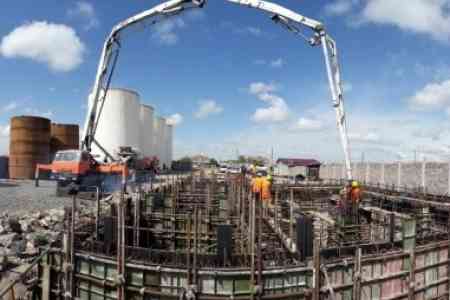


ArmInfo. Armenian Minister of Economic Development and Investments Artsvik Minasyan on August 9 presented the investment program of Armoil company on construction of a crude oil processing plant in the town of Yeghvard in the Kotayk region, asking to prolong the previously adopted government's decision to grant a deferment on payment of import customs duties on technological equipment in the framework of the investment program. The government considered the draft decision, and in view of the environmental tasks, decided to postpone its adoption for a week.
As the Minister pointed out, 250 new job places will be opened in the framework of the investment program instead of the current 100. At the same time, according to the Minister, a certain unpleasant attitude towards the plant has been formed in the society, since there is a wrong opinion that instead of a plant for processing crude oil, construction of refinery is planned, which does not correspond to reality.
Meanwhile, as Prime Minister Nikol Pashinyan noted, before the meeting of the government, he became aware that the nature protection and inspection body on mineral resources had decided to stop the construction of a small oil refinery in the town of Yeghvard, Kotayk region (on July 16, ed. note). "Do we have information related to to the assessment of the impact on the environment?" the Prime Minister asked. In response, the Minister of Nature Protection Erik Grigoryan stated that the inspection body carried out research and suspended construction of the plant. At the same time, research was carried out on the construction of an oil refinery, and not a plant for processing raw materials, in connection with which there is a legal gap. Nevertheless, the plant did not receive positive results of expertise and environmental impact assessment. As a result, even despite the proposal of Deputy Prime Minister Tigran Avinyan to approve the project, and then try to solve the problem with the environmental department, Nikol Pashinyan proposed to postpone for a week the approval of the company's application for deferment of customs payments on imported goods. "The environmental concept should be very clearly set in the core of our actions. This does not mean that there will be no refinery in Armenia, however all the actions should be exclusively within the framework of the law," he concluded.
To recall, earlier within the administrative proceedings launched on July 10 in the inspection body, it was found out that Armoil CJSC had not carried out an environmental impact assessment in accordance with the RA Law on Examination and Assessment of Impact before the construction of an oil refinery in the Nati district of Yeghvard, Kotayk region. On the basis of the abovementioned, on July 16 head of the Nature Protection and Inspection Body on mineral resources Artur Grigoryan, decided to stop the construction of the oil refinery until a positive response based on the documents on the relevant expertise and environmental impact assessment are ensured. Almost ayear ago on October 18, 2017 the inspection body had already made a decision to stop the construction of the plant. It was that time the company was obliged to make an expertise and strategic evaluation of environmental impact.
However, on March 22 in a talk to ArmInfo's correspondent General Director of the company Alfred Abadi stated that already in two-three months the oil refinery plant in Yeghvard wil become a reality. , he said.
Meanwhile, back in March 2016, in an interview with ArmInfo, the general director of Armoil (the official representative of the Lubreks brand in Armenia and the CIS countries and importing engine oils from the UAE-ed.note) Alfred Abadi noted that the main goal of the company is the production of petroleum products with labeling "Made in Armenia".
The investment package was supposed to be initially implemented in three stages, the total volume of investments - $ 35 million. The first stage of the project involves the construction of an oil refinery in Yeghvard. According to the business plan, the production capacity of the enterprise for the first time will amount to 15 thousand tons of engine oil and 6 thousand tons of tar per year. In the future, the plant will also have the opportunity to process used engine oil and use it as raw materials, which in turn will help maintain the cleanliness of the environment and ecology. The company intends to produce production amounting to 100 million drams for selling on the domestic market alone. The plant, whose area is 5 thousand square meters with further expansion to 15 thousand square meters, will also have underground and land bases, which are necessary for storing 4 thousand tons of diesel fuel, 2 tons bitumen, and 2-3 thousand tons of raw materials for the production of various oils, as well as 20 thousand tons of finished products. About $ 15 million were to be invested to implement the first stage of the program (it was planned to be completed in August 2016),. The whole program was planned to be completed within three years.